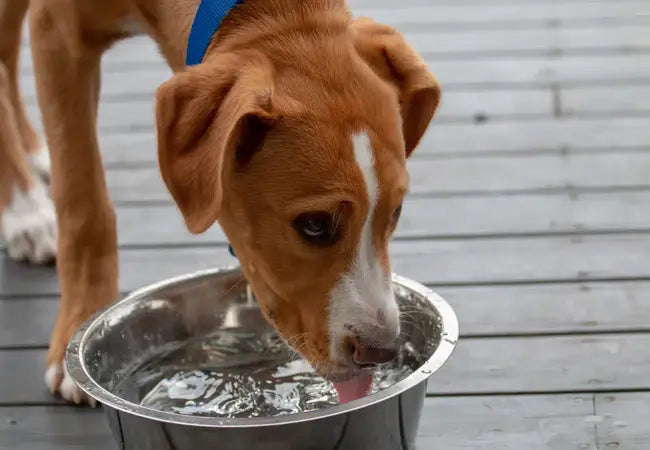Dangerous Water for Dogs 2025: 7 Vet-Identified Risks 🚱🐕

In this article
💧 7 Types of Water That Can Make Your Dog Sick in 2025 🐶
By Dr Duncan Houston BVSc
As a veterinarian, I often advise pet owners to be cautious about the water sources their dogs access. While water is essential for hydration, certain types can pose health risks. Here's a comprehensive guide to seven types of water that can make your dog sick and how to prevent exposure.
1. 🐾 Park Puddles
Overview: Dogs are naturally curious and may drink from puddles in parks or on walking trails. These puddles can contain runoff from animal feces, leading to exposure to bacteria, viruses, and intestinal parasites.
Risks: Ingesting contaminated puddle water can result in vomiting, diarrhea, dehydration, and abdominal pain.
Prevention Tips:
- Keep your dog on a leash during walks to prevent access to puddles.
- Carry a portable water bottle and bowl to provide clean water.
- Discourage your dog from drinking from unknown water sources.
2. 🌊 Stagnant Ponds and Lakes
Overview: Still bodies of water, especially during warm months, can harbor harmful bacteria, viruses, fungi, algae, and parasites like Giardia and Coccidia. Blue-green algae blooms are particularly dangerous.
Risks: Exposure can lead to liver and kidney damage, neurological issues, and skin rashes. Leptospirosis, a bacterial infection, is also a concern.
Prevention Tips:
- Avoid letting your dog swim in or drink from stagnant water bodies.
- Be cautious of water with visible algae blooms.
- Rinse your dog thoroughly if they come into contact with such water.
3. 🚽 Toilet Water
Overview: Toilet bowls may seem like a convenient water source to dogs, but they often contain cleaning agents and disinfectants.
Risks: Ingesting toilet water can cause vomiting and stomach irritation due to chemical residues.
Prevention Tips:
- Keep toilet lids closed and bathroom doors shut.
- Provide fresh, clean water in your dog's bowl at all times.
- Use pet-safe cleaning products for your bathroom.
4. 🌊 Ocean Water
Overview: While beach outings are fun, ocean water contains high levels of salt, which can be harmful if ingested in large quantities.
Risks: Drinking saltwater can lead to dehydration, vomiting, diarrhea, and in severe cases, seizures or coma.
Prevention Tips:
- Bring fresh water and a bowl to the beach to keep your dog hydrated.
- Prevent your dog from drinking seawater or retrieving soaked toys.
- Rinse your dog with fresh water after swimming in the ocean.
5. 🧪 Distilled Water
Overview: Distilled water lacks essential minerals and electrolytes, making it unsuitable as a sole water source for dogs.
Risks: Exclusive consumption can lead to electrolyte imbalances, fatigue, and neurological changes.
Prevention Tips:
- Provide your dog with tap or filtered water that contains necessary minerals.
- Consult your veterinarian if you have concerns about your dog's water intake.
6. 🏡 Home and Yard Puddles
Overview: Puddles around your home may contain runoff from fertilizers, pesticides, antifreeze, or other chemicals.
Risks: Ingestion can cause vomiting, diarrhea, neurological issues, and even death, depending on the toxin.
Prevention Tips:
- Ensure your yard is properly drained to prevent puddle formation.
- Store chemicals securely and clean up spills immediately.
- Supervise your dog when they're outside to prevent drinking from puddles.
7. 🏊♂️ Pool Water
Overview: Swimming pools contain chlorine and other chemicals that can be harmful if ingested in large amounts.
Risks: Drinking pool water can lead to gastrointestinal upset, including nausea and vomiting.
Prevention Tips:
- Provide fresh water for your dog during pool time.
- Discourage your dog from drinking pool water.
- Rinse your dog after swimming to remove chlorine from their fur.
📱 Enhance Your Dog's Safety with Technology
Modern tools can assist in managing your dog's health effectively:
- Ask A Vet App: Access expert veterinary advice and schedule consultations conveniently.
- Woopf: Utilize training resources tailored to your dog's breed and behavior.
- Purrz: Monitor your dog's activity levels and set reminders for health check-ups and medication schedules.
🎯 Conclusion
Being aware of the various water sources your dog may encounter and understanding the associated risks is crucial for their health and well-being. Always provide clean, fresh water, supervise outdoor activities, and consult your veterinarian if you suspect your dog has ingested contaminated water.
For personalized guidance and support, visit AskAVet.com and download the Ask A Vet app today! 🐾📲






